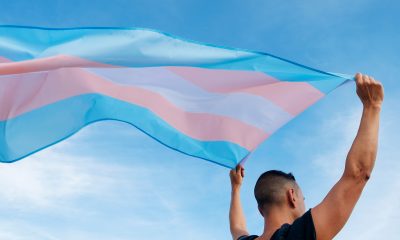Celebrity News
Harry Belafonte, ‘King of Calypso’ and LGBTQ ally, dies at 96
Civil rights icon was grand marshal of 2013 NYC Pride parade
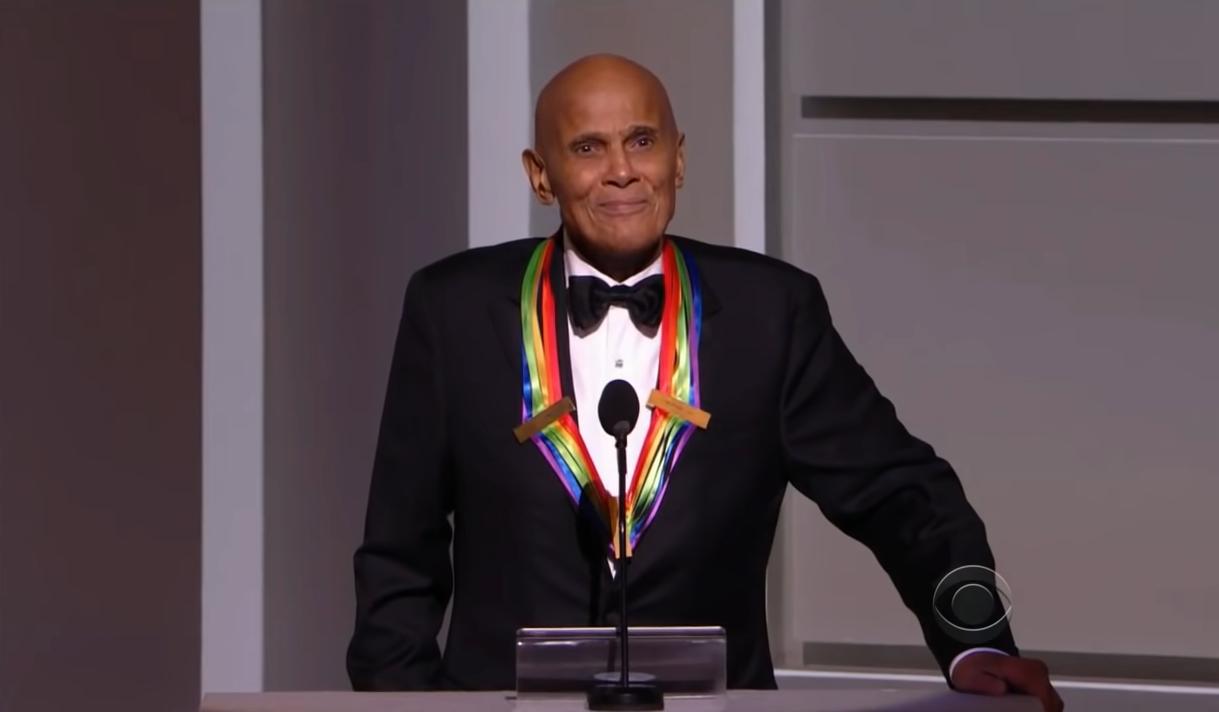
A rainbow banner slung over his right shoulder proudly proclaimed the spry octogenarian a “Grand Marshal 2013” of the New York City LGBT Pride March, joining another vibrant octogenarian, Edith “Edie” Windsor, who was also a “Grand Marshal 2013” that bright sunny June day.
Between the two of them, the honor was an acknowledgement of a long journey not only for LGBTQ rights, but for Harry Belafonte, the beloved African American actor, singer, humanitarian, and the acknowledged “King of Calypso” especially, an honored recognition of his decades of accomplishments and commitment to the civil rights movement and allyship to the LGBTQ community.
Thank you, Mr. B, for all of your years of mentorship, guidance, & lifetime of activism fighting for a better future for all of us. You will be missed by many, but your memory & impact live on. Rest in Power.
— Colin Kaepernick (@Kaepernick7) April 25, 2023
“Movements don’t die, because struggle doesn’t die.”
-Harry Belafonte pic.twitter.com/bCArTOtCC2
Born March 1, 1927, in New York, Belafonte was the son of Caribbean-born immigrants, and, growing up, he split his time between Harlem and Jamaica. Dropping out of high school in New York to enlist in the U.S. Navy, he went on to contribute to the war effort from 1944 to 1945.
At the time, the military services were segregated. Belafonte, a Jamaican American, was assigned to Port Chicago, Calif., 35 miles from San Francisco.
During World War II, Black service members were not normally assigned to frontline fighting units. Rather, they were assigned mostly to supporting specialties. His job was to load military ships bound for the Pacific theater.
Just before Belafonte arrived in Port Chicago, Calif., a massive explosion took place, involving military ships loaded with ammunition. About 320 people were killed — two-thirds of them Black sailors.
“It was the worst homefront disaster of World War II, but almost no one knows about it or what followed,” he said.
Discharged in 1945, Belafonte returned home to New York. He used his GI Bill benefits to pay for his acting classes at Erwin Piscator’s the New School Dramatic Workshop, alongside future actors Marlon Brando, Rod Steiger, Walter Matthau, and what was to develop into lifelong friendship, actor Sidney Poitier.
He performed with the American Negro Theater while studying at the Dramatic Workshop. It was a singing role that resulted in a series of cabaret engagements, and eventually, Belafonte even opened his own club. In 1949, he launched his recording career on the Jubilee label, and in 1953, he made his debut at the legendary jazz club, the Village Vanguard.
He also appeared on Broadway in the 1953 “John Murray Anderson’s Almanac,” a performance that won him a Tony Award.
Belafonte’s first widely released single, which became his signature audience participation song in virtually all of his live performances, was “Matilda,” recorded on April 27, 1953.
With a lead role in the film adaptation of Oscar Hammerstein’s Carmen Jones, Belafonte shot to stardom. After signing to the RCA label, he released Mark Twain and Other Folk Favorites, which reached the number three slot on the Billboard charts.
His breakthrough third studio album “Calypso” (RCA Victor-1956) became the first long-playing record in the world to sell over 1 million copies within a year. The album introduced American audiences to calypso music and Belafonte was dubbed the King of Calypso.
Besides calypso, he also recorded blues, folk, gospel, show tunes and American standards from “The Great American Songbook” as it is known that included works from George Gershwin, Irving Berlin and Cole Porter.
During the late 1950’s he performed during the so-called Rat Pack-era in Las Vegas. He and pianist Liberace, musician and singer Ray Vasquez, and singer Sammy Davis, Jr., were featured at the Sands Hotel and Casino and the Dunes Hotel.
Belafonte also became television’s first African-American producer, and his special “Tonight with Harry Belafonte” won an Emmy award in 1960. It was during this time period that he became proactively engaged in the civil rights movement in the 1950s and 1960s including the1963 Freedom March in D.C..
Belafonte befriended the leader of the movement, Dr. Martin Luther King, Jr., with whom he maintained close ties until King’s assassination in Memphis, Tenn., on April 4, 1968.
When I was a child, #HarryBelafonte showed up for my family in very compassionate ways.
— Be A King (@BerniceKing) April 25, 2023
In fact, he paid for the babysitter for me and my siblings.
Here he is mourning with my mother at the funeral service for my father at Morehouse College.
I won’t forget…Rest well, sir. pic.twitter.com/31OC1Ajc0V
He was also friends with New York Sen. Robert F. Kennedy, often spending time with Kennedy during the latter’s run for the U.S. Senate and also during the 1968 presidential campaign, which ended tragically after Kennedy was shot in the kitchen pantry area at the Los Angeles’ Ambassador Hotel on June 5, 1968. Kennedy died the next day on June 6, 1968, at Good Samaritan Hospital.
Prior to RFK’s assassination, on April 24, 1968, Belafonte interviewed Kennedy while guest hosting for Johnny Carson on the “Tonight Show.”
During the 1970s and 1980s, Belafonte refocused his efforts toward humanitarian causes, including joining with famed producer Quincy Jones and singer Michael Jackson on the USA for Africa’s “We Are the World,” project on March 7, 1985. Rolling Stone wryly noted in its article about the recording and humanitarian fundraiser, that the 46 star vocalists who showed up may have formed the ultimate musical supergroup of all time.
First lady Barbara Bush, standing in for her husband President George Herbert Walker Bush, presented the 12th Annual Kennedy Center Honors to Belafonte, along with his fellow honorees actress Mary Martin, dancer Alexandra Danilova, actress Claudette Colbert and composer William Schuman during a White House East Room ceremony on Dec. 3, 1989.
Two years previously, in 1987, he was appointed as a UNICEF Goodwill Ambassador, replacing Danny Kaye as UNICEF’s Goodwill Ambassador. His appointment as Goodwill Ambassador came 27 years after then President John F. Kennedy appointed Belafonte the first member of the entertainment industry to serve as cultural advisor to the Peace Corps.
In 1994, he received the National Medal of the Arts from President Bill Clinton. He has also been awarded the Ronald McDonald House Charities’ Award of Excellence in recognition of his humanitarian work and the Audrey Hepburn Humanitarian Award for 25 years of service to UNICEF.
In October 2017 he was awarded the Franklin D. Roosevelt Freedom Medal by the Roosevelt Institute in New York, the citation reading in part:
“In the decades since, you have been involved in campaigns to fight apartheid and bring relief to the world’s poorest. You founded We Are the World, which brought together some of the greatest talents in music to draw attention to and take on the scourge of famine in Africa. You have always used your platform to call out injustice and violence and make sure we never stopped believing that a more just, beautiful world was possible. Your voice — your life — has been a beacon of hope, comfort and inspiration to generations.”
Belafonte also served on the board of Americans for the Arts (formerly known as the American Council for the Arts) for many years. He has four children — Shari, Adrienne, Gina and David — and three grandchildren — Rachel, Brian and Maria. He lived with his wife photographer Pamela Frank who he had married in 2008.
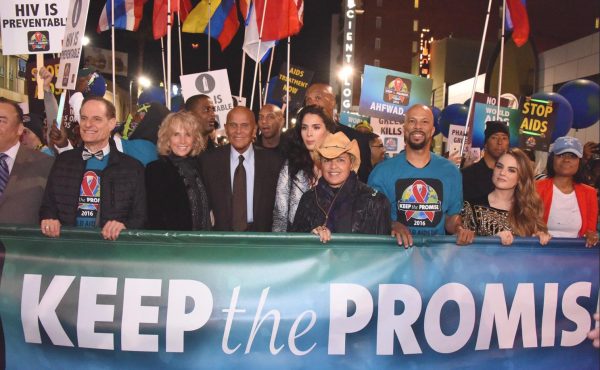
(Photo Courtesy of AHF)
“The world is a little dimmer today in losing such a legendary entertainer as Harry Belafonte but so much richer for having had such a tireless, lifelong humanitarian and activist for so many years. Rest easy, kind sir, after a job well done,” said Michael Weinstein, president of AIDS Healthcare Foundation.
“Belafonte leveraged his considerable and deserved celebrity for a myriad of causes over his lifetime, including the fight against HIV and AIDS. It was both humbling and a privilege for AHF to thank and honor him in person for his lifetime of activism and compassion.”
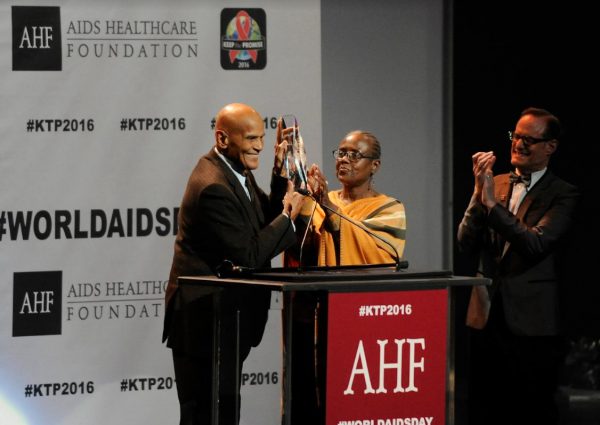
In 2016, AHF honored Belafonte with its Lifetime Achievement Award during its “Keep the Promise” World AIDS Day Concert and March in Hollywood, Calif.
Ever the activist, Belafonte, then 89, joined marchers for a brief but poignant portion of the march down Hollywood Boulevard.
The march commemorated the millions who have died of AIDS while also serving as a reminder to the world that of the then 36.7 million people living with AIDS worldwide, only 17 million had access to lifesaving antiretroviral treatment.
Belafonte received the AHF award during the concert that followed at the Dolby Theater featuring Patti LaBelle, Common and others who also paid tribute to the humanitarian icon.
Harry Belafonte was a barrier-breaking legend who used his platform to lift others up. He lived a good life – transforming the arts while also standing up for civil rights. And he did it all with his signature smile and style. Michelle and I send our love to his wife, kids, and… pic.twitter.com/g77XCr9U5b
— Barack Obama (@BarackObama) April 25, 2023
The White House issued a statement from President Joe Biden on Belafonte’s death:
“Jill and I are saddened by the passing of a groundbreaking American who used his talent, his fame, and his voice to help redeem the soul of our nation.
Harry Belafonte was born to Caribbean parents in Harlem, New York on March 1, 1927, when segregation was the order of American society. To our Nation’s benefit, Harry never accepted those false narratives and unjust boundaries. He dedicated his entire life to breaking barriers and bridging divides.
As a young man motivated to find his purpose, he became mesmerized by theater when he saw a performance of the American Negro Theater in Manhattan. As one of America’s original breakthrough singers and performers, he would go on to garner a storehouse of firsts — the first Black matinee idol, the first recording artist to sell over a million records, the first Black male Broadway actor to win a Tony award, the first Black producer to win an Emmy award, and one of the highest paid entertainers of his time, among other accolades.
But he used his fame and fortune for the public good throughout his extraordinary career. He became a powerful ally of Dr. Martin Luther King, Jr., and other giants of the Civil Rights Movement. He raised money and donated resources to post bail for activists jailed for acts of civil disobedience. He provided the critical funds to launch the Freedom Rides.
He lobbied against apartheid in South Africa, for the release of Nelson Mandela, and was one of the visionaries behind ‘We Are the World,’ an innovative record released to raise millions of dollars to support humanitarian aid in Sudan and Ethiopia. For these and other humanitarian and artistic efforts he was conferred with a Kennedy Center Honor, the National Medal of the Arts, and a Grammy lifetime achievement award.
Harry Belafonte’s accomplishments are legendary and his legacy of outspoken advocacy, compassion, and respect for human dignity will endure. He will be remembered as a great American.
We send our deepest condolences to his family and legions of admirers across the country and the world.”
Harry Belafonte was one of our favorite guest stars on The Muppet Show and a great friend to The Muppets. In his work on and off the stage, he helped us all to see one another clearly and truly turned the world around. We will never forget you, Harry! pic.twitter.com/euMQFDpvJj
— The Muppets (@TheMuppets) April 25, 2023
****************************************************************************************
Additional research and materials from the Defense Department, the Kennedy Center Honors, UNICEF, the John F. Kennedy Library, the George Bush Library, the William J. Clinton Library, the George W. Bush Library, the Barack Obama Library, RCA Records, AFI and the Recording Academy.

Rob Reiner, most known for directing untouchable classics like “The Princess Bride,” “Misery,” “When Harry Met Sally…,” and “Stand by Me,” died Dec. 14 alongside his wife, Michele Singer Reiner, in their Los Angeles residence. While investigations are actively underway, sources have told PEOPLE Magazine that the pair’s son, Nick Reiner, killed his parents and has been taken into custody.
Reiner was a master of every genre, from the romantic comedy to the psychological thriller to the coming-of-age buddy movie. But in addition to his renowned work that made him a household name, Reiner is also remembered as a true advocate for the LGBTQ community. In 2009, Reiner and his wife co-founded the American Foundation for Equal Rights, helping fight against California’s Prop 8 same-sex marriage ban. They were honored at the 2015 Human Rights Campaign Las Vegas Gala.
In a statement, HRC President Kelley Robinson said: “The entire HRC family is devastated by the loss of Rob and Michele Reiner. Rob is nothing short of a legend — his television shows and films are a part of our American history and will continue to bring joy to millions of people across the world. Yet for all his accomplishments in Hollywood, Rob and Michele will most be remembered for their gigantic hearts, and their fierce support for the causes they believed in — including LGBTQ+ equality. So many in our movement remember how Rob and Michele organized their peers, brought strategists and lawyers together, and helped power landmark Supreme Court decisions that made marriage equality the law of the land — and they remained committed to the cause until their final days. The world is a darker place this morning without Rob and Michele — may they rest in power.”
Reiner’s frequent collaborators have also spoken out as the industry is in mourning, including figures like Ron Howard and John Cusack.
A joint statement from Jamie Lee Curtis and Christopher Guest (who starred in Reiner’s “This is Spinal Tap”) reads: “Christopher and I are numb and sad and shocked about the violent, tragic deaths of our dear friends Rob and Michele Singer Reiner and our ONLY focus and care right now is for their children and immediate families and we will offer all support possible to help them. There will be plenty of time later to discuss the creative lives we shared and the great political and social impact they both had on the entertainment industry, early childhood development, the fight for gay marriage, and their global care for a world in crisis. We have lost great friends. Please give us time to grieve.”
While attending the 2019 HRC Los Angeles Dinner, Reiner spoke out about the need for equality: “We have to move past singling out transgender, LGBTQ, black, white, Jewish, Muslim, Latino. We have to get way past that and start accepting the idea that we’re all human beings. We’re all human beings, we all share the same planet, and we should all have the same rights, period. It’s no more complicated than that.”
Brazil
Black transgender singer from Brazil wins three Latin Grammy Awards
Liniker performed at Las Vegas ceremony
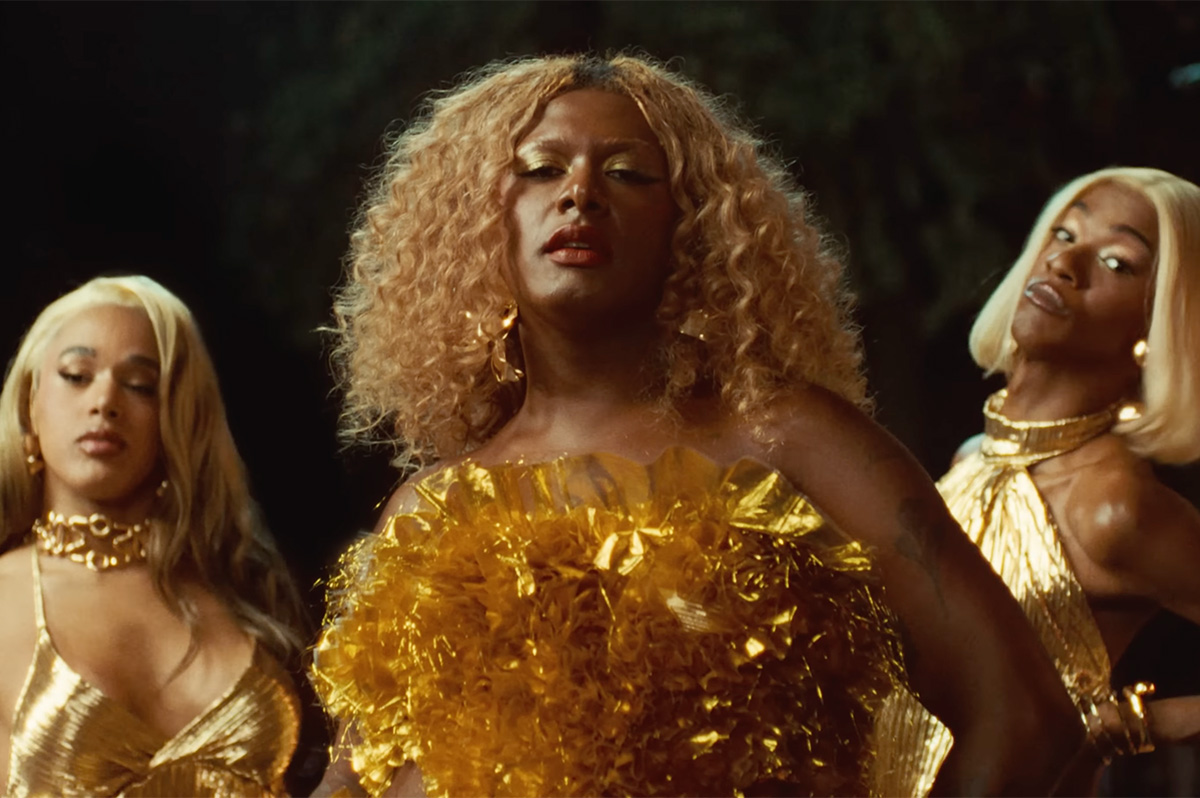
A Black transgender singer and songwriter from Brazil on Nov. 13 won three Latin Grammy Awards.
Liniker, who is from Araraquara, a city in São Paulo State, won for Best Portuguese Language Song for her song “Veludo Marrom,” Best Portuguese-Language Urban Performance for her song “Caju” from her sophomore album of the same title, and Best Portuguese Language Contemporary Pop Album for “Caju.”
She accepted the awards during the Latin Grammy Awards ceremony that took place in Las Vegas. Liniker also performed.
“I’ve been writing since I was 16. And writing, and poetry, have been my greatest form of existence. It’s where I find myself; where I celebrate so many things I experience,” said Liniker as she accepted her first Latin Grammy on Nov. 13. “And being a composer … Being a trans composer in Brazil — a country that kills us — is extremely difficult.”
Liniker in 2022 became the first openly trans woman to win a Latin Grammy.
Celebrity News
Jonathan Bailey is People’s first openly gay ‘Sexiest Man Alive’
‘It’s a huge honor. And it’s completely absurd.’
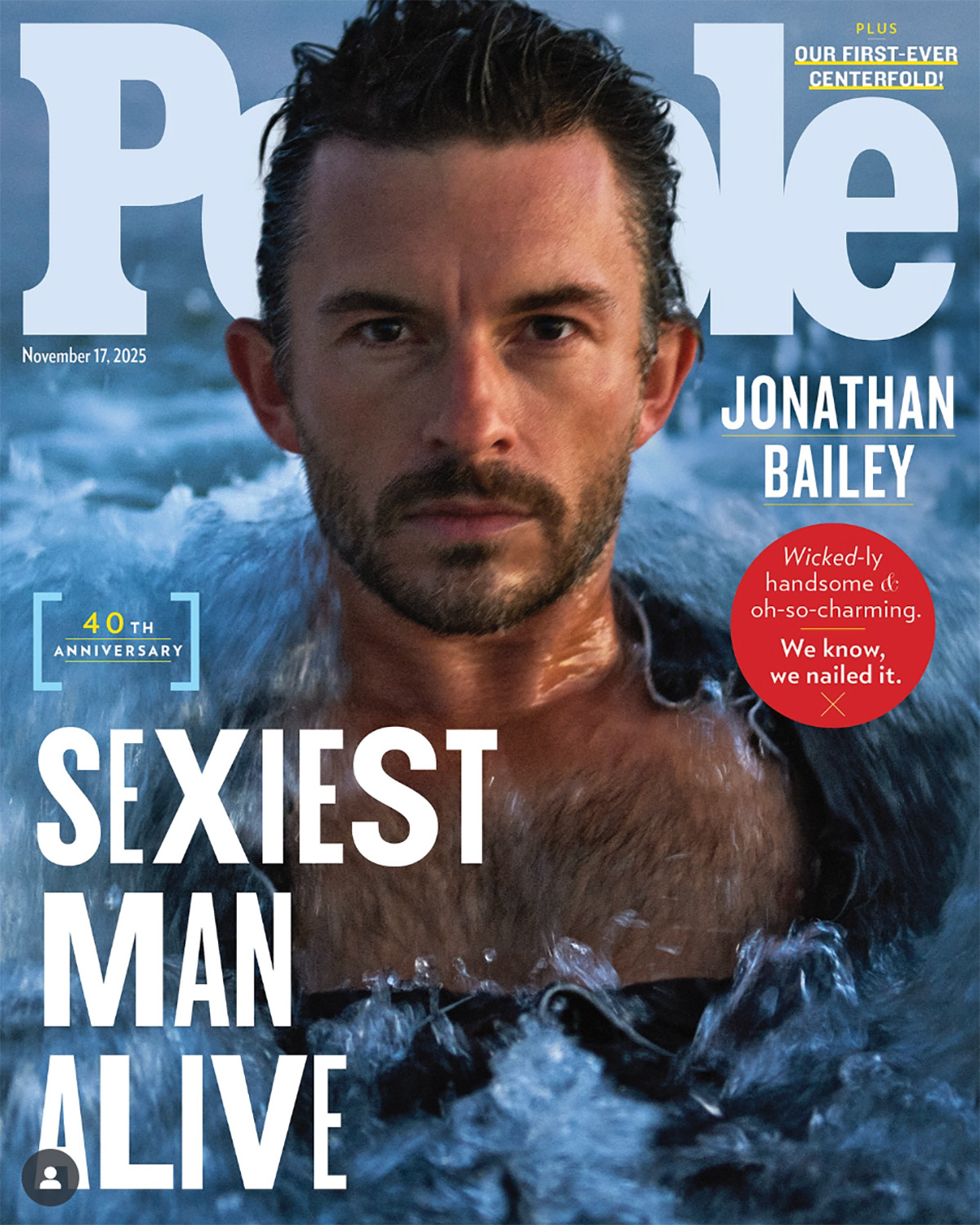
Actor Jonathan Bailey made history Monday after he was named People magazine’s first openly gay “Sexiest Man Alive.”
Bailey is known for his starring role in “Wicked,” as well as well-received turns in “Bridgerton” and “Fellow Travelers,” for which he was nominated for an Emmy. He returns to the big screen on Nov. 21 in the “Wicked: For Good” sequel.
Bailey announced the news on the Nov. 3 “Tonight Show” with Jimmy Fallon.
“It’s the honor of a lifetime,” Bailey, 37, said. “I want to say, Jimmy, thank you so much for turning it down so that I could be here.”
Bailey told People, “It’s a huge honor. Obviously I’m incredibly flattered. And it’s completely absurd. It’s been a secret, so I’m quite excited for some friends and family to find out.”
People launched its popular “Sexiest Man Alive” issue in 1985 with inaugural winner Mel Gibson. Last year’s winner was actor John Krasinski.
Bailey came out publicly in 2018 and founded a nonprofit, Shameless Fund, which raises money for LGBTQ organizations and issues.
-

 State Department5 days ago
State Department5 days agoFOIA lawsuit filed against State Department for PEPFAR records
-

 Opinions5 days ago
Opinions5 days agoTrans sports bans rooted in eugenics
-

 New York5 days ago
New York5 days agoPride flag raised at Stonewall after National Park Service took it down
-

 India5 days ago
India5 days agoTrans students not included in new India University Grants Commission equity rules

